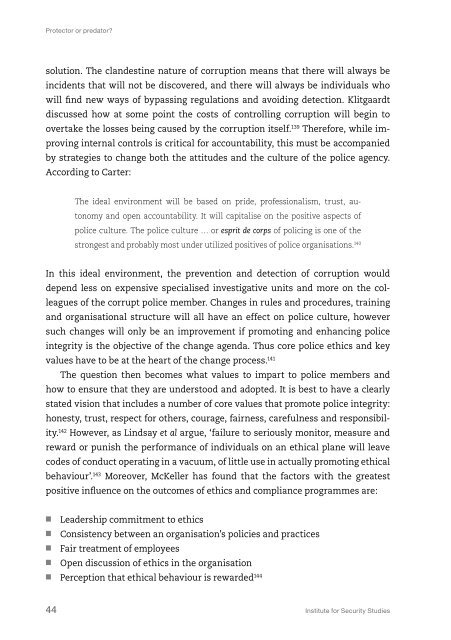Protector or predator? - Institute for Security Studies
Protector or predator? - Institute for Security Studies
Protector or predator? - Institute for Security Studies
You also want an ePaper? Increase the reach of your titles
YUMPU automatically turns print PDFs into web optimized ePapers that Google loves.
<strong>Protect<strong>or</strong></strong> <strong>or</strong> predat<strong>or</strong>?<br />
solution. The clandestine nature of c<strong>or</strong>ruption means that there will always be<br />
incidents that will not be discovered, and there will always be individuals who<br />
will find new ways of bypassing regulations and avoiding detection. Klitgaardt<br />
discussed how at some point the costs of controlling c<strong>or</strong>ruption will begin to<br />
overtake the losses being caused by the c<strong>or</strong>ruption itself. 139 Theref<strong>or</strong>e, while improving<br />
internal controls is critical f<strong>or</strong> accountability, this must be accompanied<br />
by strategies to change both the attitudes and the culture of the police agency.<br />
Acc<strong>or</strong>ding to Carter:<br />
The ideal environment will be based on pride, professionalism, trust, autonomy<br />
and open accountability. It will capitalise on the positive aspects of<br />
police culture. The police culture … <strong>or</strong> esprit de c<strong>or</strong>ps of policing is one of the<br />
strongest and probably most under utilized positives of police <strong>or</strong>ganisations. 140<br />
In this ideal environment, the prevention and detection of c<strong>or</strong>ruption would<br />
depend less on expensive specialised investigative units and m<strong>or</strong>e on the colleagues<br />
of the c<strong>or</strong>rupt police member. Changes in rules and procedures, training<br />
and <strong>or</strong>ganisational structure will all have an effect on police culture, however<br />
such changes will only be an improvement if promoting and enhancing police<br />
integrity is the objective of the change agenda. Thus c<strong>or</strong>e police ethics and key<br />
values have to be at the heart of the change process. 141<br />
The question then becomes what values to impart to police members and<br />
how to ensure that they are understood and adopted. It is best to have a clearly<br />
stated vision that includes a number of c<strong>or</strong>e values that promote police integrity:<br />
honesty, trust, respect f<strong>or</strong> others, courage, fairness, carefulness and responsibility.<br />
142 However, as Lindsay et al argue, ‘failure to seriously monit<strong>or</strong>, measure and<br />
reward <strong>or</strong> punish the perf<strong>or</strong>mance of individuals on an ethical plane will leave<br />
codes of conduct operating in a vacuum, of little use in actually promoting ethical<br />
behaviour’. 143 M<strong>or</strong>eover, McKeller has found that the fact<strong>or</strong>s with the greatest<br />
positive influence on the outcomes of ethics and compliance programmes are:<br />
■■<br />
Leadership commitment to ethics<br />
■■<br />
Consistency between an <strong>or</strong>ganisation’s policies and practices<br />
■■<br />
Fair treatment of employees<br />
■■<br />
Open discussion of ethics in the <strong>or</strong>ganisation<br />
■■<br />
Perception that ethical behaviour is rewarded 144<br />
44<br />
<strong>Institute</strong> f<strong>or</strong> <strong>Security</strong> <strong>Studies</strong>

















